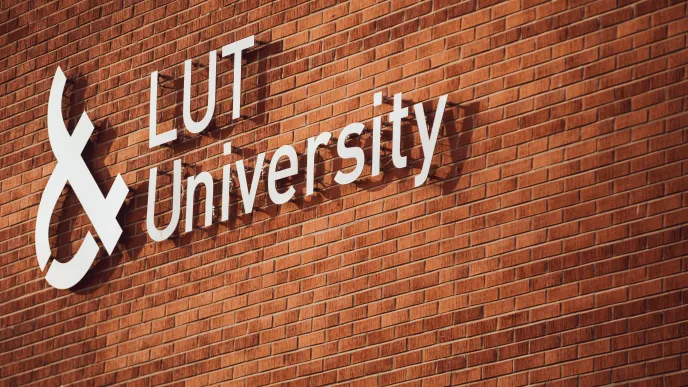The newsletter is your guide to what's happening on LUT campuses and the student community as well as to bachelor's and master's programmes updates and admission instructions. Newsletters will be delivered to your email once a month.
Are you looking to explore the dynamic and ever-growing link between fundamental and applied physics? Do you want to develop advanced and reliable devices capable of operating in harsh environments? Are you fascinated by experimental physics conducted at laboratory facilities such as CERN in Switzerland? Would you like to impact the transition from electricity generated by fossil fuels toward a more sustainable future with reliable electric alternatives?
Physics is the cornerstone of groundbreaking scientific research in various fields, including clean energy, communication and information technologies, and health and environmental sciences.
This master's programme will challenge you to go beyond your curiosity. This two-year programme is specially tailored for applied, industrial, and experimental physics, leading to a degree of Master of Science in Technology, M.Sc. (Tech). Our highly collaborative international research department provides students with an environment to develop their expertise in semiconductor technology, smart materials, superconductors, applied physics instrumentation, and computational physics, including data analysis of experiments.
The programme emphasises real-world project work, in which students will bring a project from conception to design, implementation, execution, analysis, and documentation. The programme's project focus and the broad set of skills it provides will make our students attractive to a wide range of potential employers.
Industry partners may suggest projects as extensions to their own R&D efforts, in areas such as reliability testing techniques for semiconductor components and batteries, Internet of Things architecture or cost-effective sensing devices. If you choose to develop an idea of your own, we will help you investigate its feasibility and facilitate your efforts to develop it.
Students interested in big data research will be able to contribute to the analysis of data from the CERN Compact Muon Solenoid (CMS) experiment and the development of Machine Learning (ML) analysis tools and software. The vast amount of data from CMS offers a great opportunity to tackle big data challenges. Students also gain hands-on experience with the latest ML tools and algorithms.
Admissions guide 2026
Who is this programme for?
This programme is for you if you want to apply the rules of physics to innovation and explore the interplay between fundamental and applied physics. Ideal candidates are highly motivated to create advanced and reliable devices for demanding environments, contribute to cutting-edge scientific research, and promote sustainable energy solutions.
In addition, you have
- a bachelor's degree in physics or engineering sciences, including computational engineering, electrical engineering, materials science, or a closely related field;
- a passion for applied physics and addressing real-world challenges in energy, technology, and health sciences;
- an interest in fields such as semiconductor technology, superconductors, smart materials, or computational physics.
What will you learn in the programme?
Become an expert in applied, industrial, and experimental physics.
- Develop skills in applied physics with a focus on semiconductor technology, smart materials, superconductors, experimental physics instrumentation, and computational physics, including data analysis of experiments.
- Learn the basic theories, problem solving practices, and computational and experimental methods of applied physics.
- Utilise physics in the development of various fields, including clean energy, communication and information technologies, and health and environmental sciences.
Degree structure and studies
In the Master’s Programme in Applied Physics, students receive advanced training in applied, industrial, and experimental physics. The programme focuses on properties of condensed matter, in areas such as semiconductors, superconductors, functional magnetic materials, nanostructures, and computational and experimental physics.
The Master's Programme in Applied Physics is a two-year programme leading to the degree of Master of Science in Technology, M.Sc. (Tech.), comprising 120 ECTS credits. The curriculum encompasses advanced specialisation, minor, and elective studies. Read more in this academic year’s curriculum.
Career prospects
After graduation, you will have interesting and challenging career prospects. Your career opportunities will depend on your field of specialisation, and possible jobs may include physicist, project engineer, researcher.
Career opportunities depend on the graduates’ areas of focus:
- Physicist: roles in academia and research institutions such as CERN, specialising in instrumentation, data analysis, and scientific computing.
- Project engineer: opportunities in various industries and research organisations such as VTT.
- Researcher: positions at institutions such as the Helsinki Institute of Physics, CERN, universities, and VTT.
- R&D specialist: roles in both academia and industry focusing on research and development.
- Junior researcher: opportunities within the LUT Doctoral School for further research and academic growth.
Contact Admissions Services
The LUT Admissions Services are here to assist you in all matters related to applying to international bachelor's and master's programmes.
For questions about admission criteria or entry requirements, please reach out to us by email: admission@lut.fi.
Chat with our students
Do you want to know more about studying at LUT, student life, or housing on LUT's campuses?
For questions about admission to bachelor's or master's degree studies, please email admission@lut.fi.



